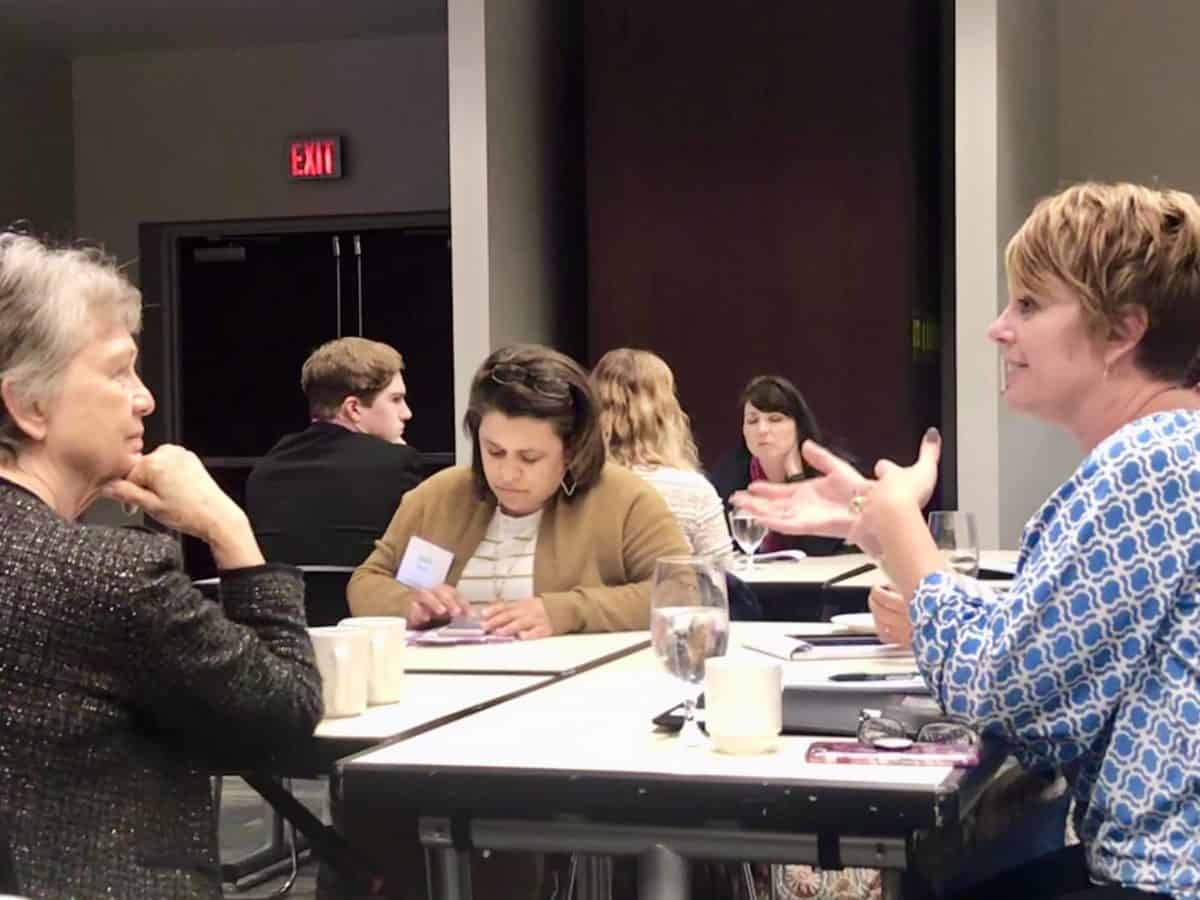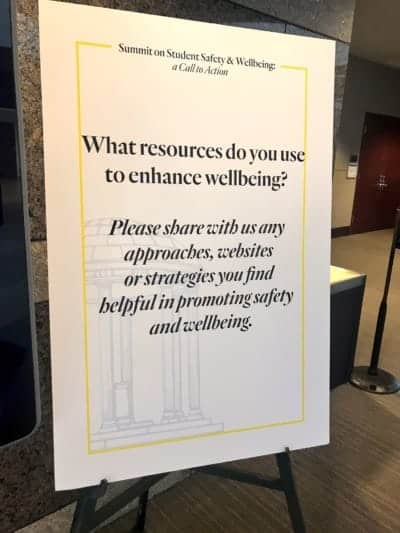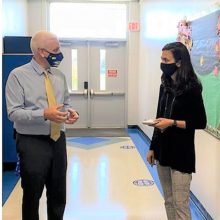

“Nothing beats the actual feeling of having a teacher that cares about you,” said MarQuay Spencer, a senior at Knightdale High School in Wake County.
Spencer and his classmate, MacKenzie Minter, went on to describe the benefits of a program implemented at their school called Capturing Kids’ Hearts (CKH), which focuses on creating relationships between teachers and students.
“Knightdale had a very bad reputation of fights and gang violence, but it’s not that anymore,” said Minter. “I think that CKH has changed it a lot because it builds the relationships between students and teachers, and it makes us trust teachers more often than students do in other schools.”
“We’re not saying go out and spend a whole bunch of money on a program,” said Spencer. “Making a difference starts with making sure your classroom is welcoming.”
Spencer’s and Minter’s comments reflect an ongoing theme during the Summit on Student Safety and Wellbeing: relationships between students and the adults at school are key.


The two-day event in Chapel Hill was jointly organized by UNC-Chapel Hill Schools of Education, Medicine, Public Health, and Social Work. During panels and breakout sessions, students, teachers, parents, school support staff, clinicians, researchers, legislators, and law enforcement engaged in discussions about how to improve student safety and wellbeing in North Carolina.
Certain proposed solutions to school safety that have come up in the national conversation — including arming teachers and increasing security at school buildings — were notably absent from the summit. Rather, sessions focused largely on the physical, social, emotional, and behavioral health of students with solutions such as funding more school support staff, strengthening peer-to-peer mentorship programs, and building strong relationships between and among the students and adults in a school.
Insight from national experts
Two plenary sessions from leading national experts in student safety and wellbeing added fresh perspectives to summit discussions. Ron Astor, the Lenore Stein-Wood and William S. Wood Professor of School Behavioral Health at the University of Southern California School of Social Work and School of Education, presented on a systems approach to promoting student safety and wellbeing.
Astor spoke on the importance of moving away from hardening school buildings and towards a systematic approach that creates a welcoming and nurturing school environment.
“We have an immediate response to the shootings that has to do with zero tolerance, metal detectors, expulsion,” said Astor. “There isn’t a lot of data to show that this actually is helpful for our goal of what kind of citizenry or what kind of society we want to live in — it is a response to what you do when you’re being attacked.”
Astor went on to describe the importance of “building a system rather than implementing a program” to achieve a welcoming and nurturing school environment. He emphasized that the sustainability of such efforts require both buy-in from all stakeholders involved in the school and the use of data to track outcomes and hold the school accountable.
.@AstorAvi is discussing a systems approach to student safety and wellbeing, and compares the implementation to having “central air, not window units.” #NCStudentSafety pic.twitter.com/05etue4LYh
— Analisa Sorrells (@analisasorrells) November 30, 2018
The core of Astor’s model is that a change in school organization and an improvement in school climate can improve students’ lives regardless of the risk factors they experience outside of the school walls.
During his research in countries like Israel and Chile, Astor has found these “oasis” schools.
“They [the schools] are still in poor, high crime areas in places all over the world, but they have a vision that the school could actually change the world,” said Astor. “That those kids in those schools are not just here to fix or remediate all the risk factors that came from their environments, but that kids that attend those particular schools could actually change the world.”
Dr. Dorothy Espelage, a Professor in the Department of Psychology at the University of Florida, presented on research-informed bullying and sexual violence prevention among youth. Espelage began by describing the history of schools in the United States adopting anti-bullying and student wellness programs from other countries with no regard to adaptation, rendering them virtually useless.
She then described multiple evidence-based programs that have moved the needle on bullying and school violence, including Second Step, a program focused on social-emotional learning (SEL).
.@DrDotEspelage on social-emotional learning: “However we want to talk about it, we’re talking about teaching kids empathy, perspective taking, decision making. If you do it for your kids, why wouldn’t we do it for every kids that enters school in America?” #NCStudentSafety
— Analisa Sorrells (@analisasorrells) December 1, 2018
According to Espelage, programs like Second Step are effective when they are implemented with fidelity and fully integrated into the infrastructure of a school system.
“This willy-nilly adoption of programs for this and this and this is not going to fix our problem,” said Espelage. “We need to think about SEL competencies as being part of that system and that structure.”
After Espelage’s presentation, attendees broke into smaller sessions to dig into various aspects of school safety. Topics included promoting equity and combating discrimination in schools, integrating SROs into school supports, and the role of school nurses in promoting socio-emotional development. A full list of summit sessions can be found here.
Legislators weigh in
Throughout the summit, elected representatives attended and engaged in numerous sessions. On Saturday, four representatives — Rep. John Torbett, R-Gaston, Rep. Bobbie Richardson, D-Franklin, Rep. Craig Horn, R-Union, and Rep. Graig Meyer, D-Orange — participated in a panel moderated by Ferrel Guillory, Professor of the Practice and Director of the Program on Public Life at the UNC-Chapel Hill School of Media and Journalism.
In passing, a conference attendee told me that she’s attended similar statewide forums on school safety before in other states, but the thing that sets NC’s apart is the amount of legislators present and their ongoing attendance/participation in summit sessions. #NCStudentSafety
— Analisa Sorrells (@analisasorrells) December 1, 2018
Torbett, chairman of the House Select Committee on School Safety, gave an update on the committee’s work thus far. The committee began meeting in March following the mass shooting at Marjory Stoneman Douglas High School in Parkland, Fla. and more recently met in various towns across North Carolina as part of a listening tour.
According to Torbett, the committee is focusing more on the “offensive,” preventative approach — or addressing the mental and behavioral health of students — than on the “defensive,” retroactive approach of hardening the structure of schools.
“We’re trying to find the core, the root, whatever it is that we can address and get started to fix it today so just maybe in 10 years or 15 years you don’t have another Las Vegas incident for example,” said Torbett. “We do believe it hinges on mental and behavioral health.”
Torbett went on to give a preview of the legislation that the committee will bring forth on Dec. 6 to move forward in the next long session, including routine mental health screenings in schools, curriculum on civil discourse, and peer-to-peer mentorship programming.
Horn spoke to the difficulties of designing statewide school safety policies given the nuances of what might be appropriate in a rural district versus an urban district. Responding to a question about what should not be done, Horn said:
“We should not be arming every teacher in every school. We should not be turning our schools into fortresses. We should not be looking for scapegoats.”
Meyer, a school social worker by training and the former coordinator of the Blue Ribbon Mentor-Advocate Program, reiterated the need to increase funding for school counselors, school social workers, school psychologists, and school nurses.
“One of the things that we built our program on was research that said that every kid needs at least five consistent, supportive adults in their life. We used to go through the kids in our mentoring program and count — could we get to five?” said Meyer. “We know that in today’s society there are too few kids who have even an easy way to get to number one, and so schools have to start filling in that gap.”
Julie Pittman, the 2018 North Carolina Western Regional Teacher of the Year from R-S Central High in Rutherford County, was encouraged to hear that funding more school support staff is a priority for the legislators.
“I do not think it can be overstated that we need more support professions in schools (nurses, counselors, psychologists, etc.) on a full-time basis,” said Pittman. “Schools are a microcosm of the community, and our students deserve to have access to trained professionals who can help address their needs daily.”
What’s next?
In the final session of the summit, attendees came together to build “a road map to action” for student safety and wellbeing.
“Even the best policies, programs, and evidence-based programs won’t do a single thing unless they’re actually implemented,” said Lora Cohen-Vogel, a professor in the School of Education. “We hope to inspire you to set forth a statement of action. What is the next step you will take to solve this problem that brings us together today?”
Sticking to the road map analogy, facilitators then presented the audience with their “fuel” — an online library of resources built from participant suggestions throughout the summit. This website will continue to grow as participants suggest resources to add.
Summit attendees then split themselves into three affinity groups: envisioning the ideal school staffing mix to support whole child education, envisioning the school-community relations that will best lead to the whole child benefit, and envisioning optimal ways to engage youth as peer mentors, thought leaders, and change agents for student wellbeing.
Addressing attendees on the first day of the summit, Dr. Fouad Abd-El-Khalick, Dean of the UNC School of Education, gave the following remark:
“This is a challenge that we need to take head on. We simply cannot afford not to. Our ultimate goal is to point us in a direction that will eventually enable North Carolina to lead the nation through a comprehensive and effective response that ensures the safety and wellbeing of all students in our schools.”
Editor’s note: Ferrel Guillory is a founder of EducationNC and serves as an editorial advisor to CEO Mebane Rash.
This article was updated at 1:06 p.m. to include a comment from Julie Pittman.


